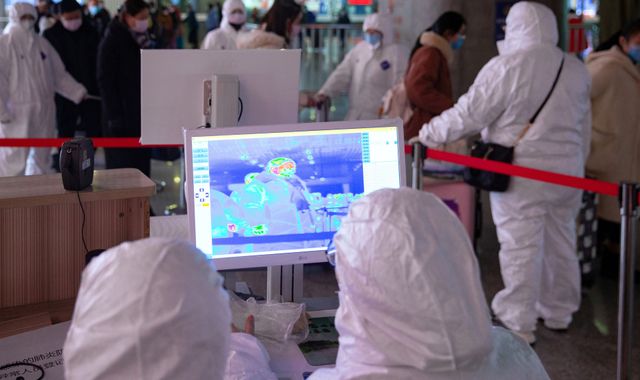Fewer than half COVID-19 carriers detected by screening, study finds
Written by News on 26/02/2020
Screening travellers for COVID-19 will detect the virus in fewer than half of those infected, a new study suggests.


Governments around the world have introduced screening, including taking temperatures and health questionnaires, in an attempt to detect anybody with the virus as they enter or leave a country.
But a team of scientists who previously looked at screening for Ebola, SARS and MERS in 2015 has found the nature of COVID-19 means screening is not very effective.
Their study, published in the eLife scientific journal, suggests travellers who were infected but showed no symptoms – fever or a cough – were the main reason screening did not work well.
They also said they could not rule out that large numbers of cases are being transmitted by children who are not showing symptoms, with very few under 20s recorded as having contracted the virus so far.
Infected travellers showing no symptoms
One of the authors, Dr Adam Kucharski, infectious disease epidemiologist at the London School of Hygiene and Tropical Medicine, told Sky News: “If you have a lot of people who travel in the incubation period they probably won’t have developed symptoms so won’t be picked up by screening.
“There’s a lot of uncertainty about contact with people who are infected. Chances are you’re going to miss the majority of them through screening.”
He explained that the team built on their previous study and developed a virtual screening process to look at how many infected people would be detected.
Dr Kucharski added: “A lot of the evidence, looking at international cases, a lot weren’t picked up at airports.
“There is varying screening ability in countries, usually depending on how wealthy or not they are.
“If you’re relying solely on screening to detect those with COVID-19, it won’t happen.
“There needs to be secondary testing and information given to passengers on what to do if they develop symptoms or find out they have been in contact with someone who has COVID-19.
“The British government is doing this and it is really important as that is how we can stop it spreading.”
England’s chief medical officer Professor Chris Whitty has suggested the widespread closure of schools and limiting public transport could be necessary to contain the virus.
“There’s no secret there’s a variety of things you need to look at, you look at things like school closures, you look at things like reducing transport,” he said.
Families could also be asked to self-isolate if one of them had symptoms.
The study suggests there should be two successive fever screening stations at airports, ports or anywhere screening is being carried out to increase reliability.
It said as risk factors become better known, questionnaires could be refined to identify more potential cases.
A rapid test would be beneficial, with the authors saying at least one SARS test claimed to take less than an hour, although they acknowledged this could be expensive.
What to do if you are travelling
Dr Kucharski said it is important to follow guidelines on what to do if you are travelling to protect yourself from getting COVID-19.
He added: “There are obviously regions that are higher risk than others, but any travellers need to follow guidelines closely because it’s changing very quickly.
“If the guidelines change, think about how that might affect you. Remember, there is potential for transmission to occur when symptoms are not showing.”
:: Listen to the Daily podcast on Apple Podcasts, Google Podcasts, Spotify, Spreaker
Helping prevent the spread
Everybody should be vigilant about reducing the risk of infection, especially as it is winter, Dr Kucharski said.
He added: “At this stage, getting into those good habits is a good idea.
“Good hand washing and not touching your face is essential.
“If people show symptoms, then follow guidance and try to reduce risk of transmission by self-isolating.”
He added that for those who are well, wearing a face mask will not help and may make people touch their faces even more.
Masks will have slightly more effect for those who are ill, to help prevent spreading, but he said self-isolating is better than wearing a face mask.
(c) Sky News 2020: Fewer than half COVID-19 carriers detected by screening, study finds







